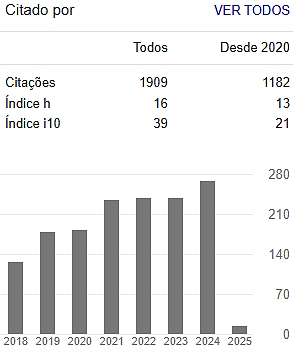Practical experiences in daycare and the development of baby awareness
DOI:
https://doi.org/10.5747/ch.2023.v20.h562Keywords:
Babies, Practical experiences, AwarenessAbstract
The present study was motivated by theoretical findings that indicate that, when working with babies in day care, in general, there are still conceptions that characterize the routine as household chores, focused on protection, food and hygiene, a non-directive teaching job, spontaneous, based on everyday life and waiting for the baby's development to come and that, for this reason, there is no pedagogical work to be done with him. This text aims to defend the pedagogical practices experienced at the daycare as promoters of the baby's awareness development. We understand consciousness as a typically human capacity that develops through social interactions and cultural appropriations since the birth of the baby. This theoretical-bibliographic study is based on historical-cultural theory and its understanding of child development process. This theory has helped us to understand human development from an early age in distinctive periods which each have their leading activities that contribute most to this process. As a result it shows us the necessity of intentional pedagogical practices mediations to provide babies with moments of objects exploration and relationships with more experienced individuals who use speech to signify human actions. Such discussion collaborates with the teacher in his function, who plans and organizes didactic elements in order to enable the baby's development of consciousness in the daycare center.
Downloads
References
ÁVILA E. A. Premisas de la actividad com los objetos em el primer año de vida. In: GOMÉZ A. M. A. et al. Estudio sobre las articularidades del desarrollo del niño pré-escolar cubano. Pueblo y Educación, Ciudad de La Habana, 2002. p. 91-113.
BOZHÓVICH, L. Stages in the Formation of the Personality in Ontogeny. Soviet Psychology, v. 17, n. 3, p. 3-24, 1979. DOI https://doi.org/10.2753/RPO1061-040517033.
ELKONIN, D. Psicologia do jogo. São Paulo: Martins Fones, 2009.
GOMES C. A. V. O lugar do afetivo no desenvolvimento da criança: implicações educacionais. Psicologia em Estudo, Maringá, v. 18, n. 3, p. 509518, jul./set. 2013. Disponível em: http://www.scielo.br/pdf/pe/v18n3/v18n3a11.pdf. Acesso em: 05 jan. 2019.
GOMES C. A. V.; MELLO S. A. Educação escolar e constituição do afetivo: algumas considerações a partir da Psicologia Histórico-Cultural. Perspectiva, Florianópolis, v. 28, n. 2, 677-694, jul./dez. 2010. Disponível em: https://periodicos.ufsc.br/index.php/perspectiva/article/view/2175795X.2010v28n2p6. Acesso em: 05 jan. 2019.
HOLMES, M. Primatas. In: Life. Inglaterra, 580 min., 2009. (BBC TV Series)
LEONTIEV, A. N. O desenvolvimento do psiquismo. 3. ed. Lisboa: Horizonte Universitário, 1978.
LEONTIEV, A. Uma contribuição para a teoria do desenvolvimento da psique infantil. In: VYGOTSKY, L. S., LURIA A. R., LEONTIEV A., N. Linguagem, desenvolvimento e aprendizagem. São Paulo: Edusp, 1989. p. 59-83.
MELLO, S. A. Algumas implicações pedagógicas da escola de Vygotsky para a educação infantil. Pró-Posições. Campinas, v. 10, n.1, p. 16-27, 1999. https://periodicos.sbu.unicamp.br/ojs/index.php/proposic/article/view/8644097. Acesso em: 05 jan. 2019.
MUKHINA, V. Psicologia da idade pré-escolar. São Paulo: Martins Fontes, 1996.
PASQUALINI J. C. Periodização do desenvolvimento psíquico à luz da escola de Vigotski: a teoria histórico-cultural do desenvolvimento infantil e suas implicações pedagógicas. In: MARSIGLIA A. C. G. (org.) Infância e pedagogia histórico-crítica. Campinas, SP, Autores associados, 2013.
REPKIN V. V. Ensino de desenvolvimento e atividade de aprendizagem. Journal of Russian and East European Psychology, v. 41, n. 4, p. 85-99, jul./ aug., 2003.
SILVA, J. R. O movimento do bebê na creche: indício orientador do trabalho docente. 2017. Tese (Doutorado em Educação) - Universidade Estadual Paulista, Presidente Prudente, 2017.
TREVARTHEN, C. Communication and cooperation in early infancy: a description of primary intersubjectivity. In: BULLOWA, M. (ed.). Before speech: the beginning of interpersonal communication. New York: Cambridge University Press, 1979. p. 321–347.
VYGOTSKY, L. S. Mind in society: the development of higher psychological processes. Cambridge, MA: Harvard University Press, 1978.
VYGOTSKY, L. S. ‘The problem of the environment’. In: VAN DER VEER, R.; VALSINER, J. (eds) The Vygotsky Reader. New York: John Wiley & Sons, 1994. p. 338-354.
VYGOTSKY, L. S. Quarta aula: a questão do meio na pedologia. Psicologia, São Paulo, v. 21, n. 4, p. 681-701, 2010.Disponível em: http://www.scielo.br/scielo.php?script=sci_arttext&pid=S010365642010000400003. Acesso em: 12 fev. 2022.
VYGOTSKY, L. S. Obras escogidas. 2. ed. Madrid: Machado Libros. 2006. Tomo IV.
ZAPORÓZHETS, A. V. Importância dos períodos iniciais da vida na formação da personalidade infantil. In: DAVIDOV, V.; SHUARE, M. (orgs). La Psicologia Evolutiva y Pedagógica en la URSS (Antologia). Moscou: Editorial Progresso, 1987. p. 228-249.

